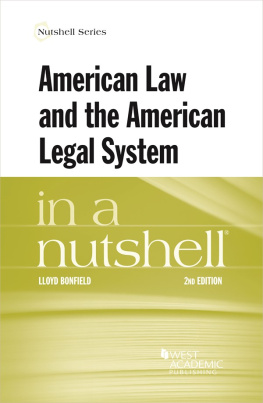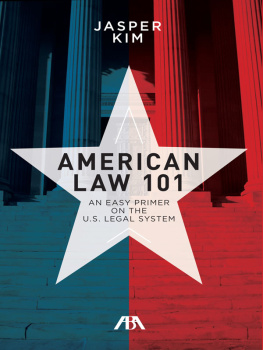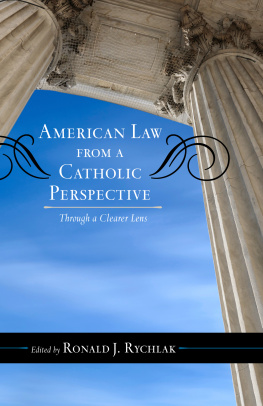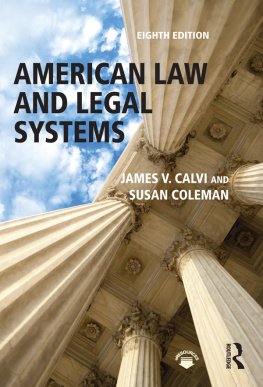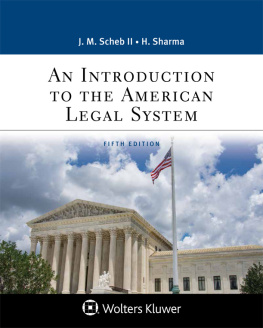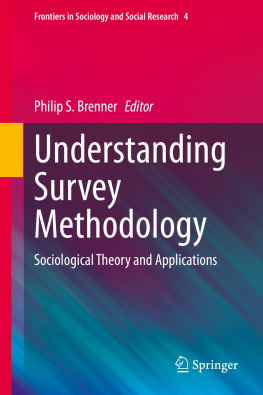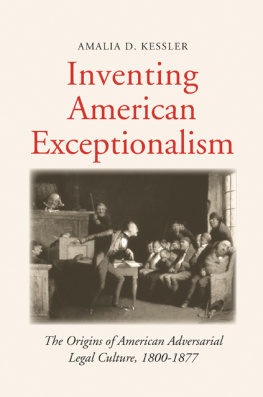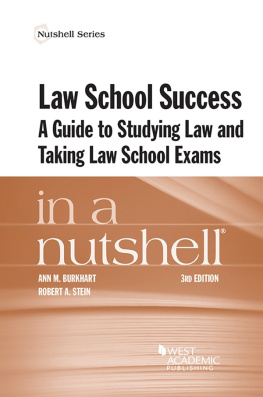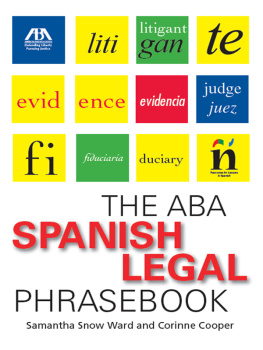West Academic Publishings Emeritus Advisory Board
Jesse H. Choper
Professor of Law and Dean Emeritus
University of California, Berkeley
Yale Kamisar
Professor of Law Emeritus, University of San Diego
Professor of Law Emeritus, University of Michigan
Mary Kay Kane
Professor of Law, Chancellor and Dean Emeritus
University of California, Hastings College of the Law
Larry D. Kramer
President, William and Flora Hewlett Foundation
James J. White
Robert A. Sullivan Professor of Law Emeritus
University of Michigan
West Academic Publishings Law School Advisory Board
Joshua Dressler
Distinguished University Professor Emeritus
Michael E. Moritz College of Law, The Ohio State University
MEREDITH J. DUNCAN
Professor of Law
University of Houston Law Center
RENE M c DONALD HUTCHINS
Dean and Joseph L. Rauh, Jr. Chair of Public Interest Law
University of the District of Columbia David A. Clarke School of Law
RENEE KNAKE JEFFERSON
Joanne and Larry Doherty Chair in Legal Ethics &
Professor of Law, University of Houston Law Center
ORIN S. KERR
Professor of Law
University of California, Berkeley
Jonathan R. Macey
Professor of Law,
Yale Law School
DEBORAH JONES MERRITT
Distinguished University Professor,
John Deaver Drinko/Baker & Hostetler Chair in Law
Michael E. Moritz College of Law, The Ohio State University
Arthur R. Miller
University Professor, New York University
Formerly Bruce Bromley Professor of Law, Harvard University
Grant S. Nelson
Professor of Law Emeritus, Pepperdine University
Professor of Law Emeritus, University of California, Los Angeles
A. Benjamin Spencer
Dean & Chancellor Professor of Law
William & Mary Law School
American Law and the American Legal System
In a nutshell
Second Edition
Lloyd Bonfield
Thomas J. Andr, Jr. Professor of Law
Tulane University School of Law (Retired)
Visiting Professor of Law
Tulane University School of Law
Professor of Law and Director of the Center for International Law Emeritus
New York Law School

The publisher is not engaged in rendering legal or other professional advice, and this publication is not a substitute for the advice of an attorney. If you require legal or other expert advice, you should seek the services of a competent attorney or other professional.
Nutshell Series, In a Nutshell and the Nutshell Logo are trademarks registered in the U.S. Patent and Trademark Office.
2006 Thomson/West
2021 LEG, Inc. d/b/a West Academic
444 Cedar Street, Suite 700
St. Paul, MN 55101
1-877-888-1330
West, West Academic Publishing, and West Academic are trademarks of West Publishing Corporation, used under license.
Printed in the United States of America
ISBN: 978-1-63460-645-5
For Lisa Bonfield, J. D.
Preface to the Second Edition
It is pretension, bordering on arrogance, to write a book on American law and the American legal system that purports to be comprehensive. How can one justify such lack of humility?
This book was born of catastrophe, although the inspiration for it was not. The latter: in 2002, Marc Firestone, European Union General Counsel for Altrias Phillip Morris International subsidiary (later President of External Affairs and General Counsel of Phillip Morris International) decided that the lawyers under his tutelage should know more about American law and legal reasoning. He asked me to put together a program in Evian, France, which I was happy to do, and about a dozen of my Tulane colleagues participated. It was an experience never to be forgotten. The former: all thought of a book on the subject dissolved until Hurricane Katrina ravaged New Orleans in 2005. I evacuated to New York, without a single document pertaining to a book I was writing on probate litigation in the Prerogative Court of Canterbury in seventeenth-century England. What else was I to do? American law. Although I was asked many times to update it, it took another catastrophe, the COVID plague (during which I was also left without documents) to find time to do so.
For this second edition, I would like to warmly acknowledge Kirsten Kovats and Michael Kazamais, students at New York Law School for their dedication, good humor and hard work in helping me update the volume. Although not generally predisposed to the University of Chicagos Law and Economic mantra, I always believed that the transaction costs in employing student research assistants outweighed the benefits. Once again I was proved wrong.
Preface to the First Edition
I wrote this book because I thought I had something interesting to say about American law to both foreign lawyers and aspiring American law students. But as I worked through the various chapters, I realized that I also had a lot to learn about the subject in which I claimed expertise. Like our kin who work with the law in the so-called real world, academic lawyers also practice law, we never really know it; all we do is to continue to learn about it and marvel at its complexity. So even though I have been at the podium for better than a quarter of a century, writing this book has been a learning experience for me.
I have been blessed with wonderful teachers. I have learned both from my elders (some sadly de parted), and from those who constitute the future of the law teaching profession: my young colleagues at Tulane. While directing summer schools in Siena and Cambridge, this English legal historian learned American constitutional law, civil procedure, and evidence from two masters of the federal bench in New Orleans, the Honorable Morey L. Sear, late Chief Judge of the Eastern District of Louisiana, and his colleague and friend, the Honorable Martin L.C. Feldman. In the same unlikely venues, I learned American legal history from the Chief, the Honorable William H. Rehnquist, camped beside students, listening to him talk about the institution that he loved, the Supreme Court of the United States.
At the other end of the demographic spectrum, I must have bewildered the new generation of colleagues at Tulane, those hired in the twenty-first century, Felice Batlan, Chris Cotropia, Onnig Dom balagian, Jonathan Nash and Rafael Pardo, with barrages of specific questions about the law in their areas of expertise. While they no doubt viewed the interrogation as a rite of passage for tenure, it was merely to make sure that I got much of what follows right.
Colleagues also read individual chapters and made useful additions and corrections. Michael Collins and Jancy Hoeffel took a double dose, as did my cousin Arthur Bonfield of the University of Iowa, who certainly must hold the record for the amount of red ink that graced a single page of typescript. Harvey Couch, Steve Griffin, Dan Posin, Brooke Overby, Mark Wessman, and Anne Woolhandler could only bear single draft chapters. Danielle Babashaw provided excellent research assistance, and would no doubt have done more had not a po tent young lady called Katrina played havoc with her senior year at Tulane.
My wife Adriana and my daughter Lisa deserve more than thanks for tolerating a person who thinks of little else but the law, past and present, and who runs the household like a classroom. I dedicate the book to Lisa, with the following reverie. As a young lad growing up in suburban New York, I once visited the Ford plant in Mahwah, New Jersey. Bits of cars would pass down the various conveyors, and every so often a yellow one would be assembled, destined for what I regarded as the worst of fates for an automobile, a New York City taxicab. The human equivalent, I reckon, is for a baby to roll down the line and be allocated to a law professor. She has more than met the challenge, and I love her dearly.

